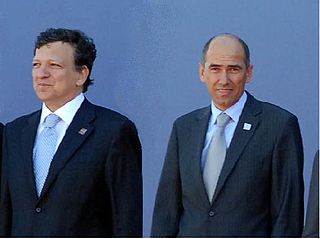Related Research Articles

The Organization for Security and Co-operation in Europe (OSCE) is the world's largest security-oriented intergovernmental organization. Its mandate includes issues such as arms control, promotion of human rights, freedom of the press, and fair elections. It employs around 3,460 people, mostly in its field operations but also in its secretariat in Vienna, Austria, and its institutions. It has its origins in the mid 1975 Conference on Security and Co-operation in Europe (CSCE) held in Helsinki, Finland. The OSCE is concerned with early warning, conflict prevention, crisis management, and post-conflict rehabilitation. Most of its 57 participating countries are in Europe, but there are a few members present in Asia and North America. The participating states cover much of the land area of the Northern Hemisphere. It was created during the Cold War era as an East–West forum.

Totalitarianism is a form of government and a political system that prohibits all opposition parties, outlaws individual opposition to the state and its claims, and exercises an extremely high degree of control over public and private life. It is regarded as the most extreme and complete form of authoritarianism. In totalitarian states, political power is often held by autocrats, such as dictators and absolute monarchs, who employ all-encompassing campaigns in which propaganda is broadcast by state-controlled mass media in order to control the citizenry. It remains a useful word but the old 1950s theory was considered to be outdated by the 1980s, and is defunct among scholars. The proposed concept gained prominent influence in Western anti-communist and McCarthyist political discourse during the Cold War era as a tool to convert pre-World War II anti-fascism into post-war anti-communism.
Soviet and Communist studies is the field of historical studies of the Soviet Union and other Communist states as well as of Communist parties such as the Communist Party USA that existed or still exist in some form in many countries, inside or outside the former Soviet Bloc. It is a field rife with conflict and controversy.
Neo-Stalinism is the promotion of positive views of Joseph Stalin's role in history, the partial re-establishing of Stalin's policies on certain issues and nostalgia for the Stalin period. Neo-Stalinism overlaps significantly with neo-Sovietism and Soviet nostalgia. Various definitions of the term have been given over the years.
In the resolution 1481/2006 of the Council of Europe Parliamentary Assembly (PACE) issued on 25 January 2006 during its winter session, the Council of Europe "strongly condemns crimes of totalitarian communist regimes".

Lars Göran Axel Lindblad is a Swedish politician and member of the Moderate Party. He served as a member of the Swedish parliament 1997–2010, representing the constituency of Gothenburg. He served as a replacement member of parliament 1993–1997, and again since 2010. Lindblad has chaired the Swedish delegation to the Parliamentary Assembly of the Council of Europe (PACE) and served as Vice President of PACE as well as chair of the Political Affairs Committee. He was a member of the Parliamentary Assembly 2004–2010. In October 2011, he was elected President of the Platform of European Memory and Conscience.
The Holodomor was a famine in the Ukrainian SSR and adjacent Cossack territories between 1932 and 1933, in which millions of Ukrainians died from starvation. Opinions and beliefs about the Holodomor vary widely among nations: the event is considered a genocide by Ukraine and fifteen out of 195 other nations, a crime against humanity by the European Parliament, and part of the wider Soviet famine by the Russian Federation.

Emanuelis Zingeris is a Lithuanian philologist, museum director, politician, signatory of the 1990 Act of the Re-Establishment of the State of Lithuania, currently serving as a Member of the Seimas, chairman of its foreign affairs committee, Vice President of the Parliamentary Assembly of the Council of Europe and President of the Parliamentary Forum of the Community of Democracies. A Lithuanian Jew, he has been director of the Vilna Gaon Jewish State Museum, honorary chairman of Lithuania's Jewish community, and is Chairman of the International Commission for the Evaluation of the Crimes of the Nazi and Soviet Occupation Regimes in Lithuania. He is a founding signatory of the Prague Declaration on European Conscience and Communism, that proposed the establishment of the European Day of Remembrance for Victims of Stalinism and Nazism.
The Institute for Information on the Crimes of Communism (IICC) is a Sweden-based non-profit and non-governmental human rights organization, founded in 2008, with the stated purpose of "spreading essential information on the crimes of communism and to promote vigilance against all totalitarian ideologies and antidemocratic movements". The institute is a member organization of the Platform of European Memory and Conscience, an educational project of the European Union bringing together government institutions and NGOs active in research, documentation, awareness raising and education about the crimes of totalitarian regimes.

The Black Ribbon Day, officially known in the European Union as the Europe-wide Day of Remembrance for the victims of all totalitarian and authoritarian regimes, is an international day of remembrance for victims of totalitarian regimes, specifically Stalinist, communist, Nazi and fascist regimes. Formally recognised by the European Union, the Organization for Security and Co-operation in Europe and some other countries, it is observed on 23 August. It symbolises the rejection of "extremism, intolerance and oppression" according to the European Union. The purpose of the Day of Remembrance is to preserve the memory of the victims of mass deportations and exterminations, while promoting democratic values to reinforce peace and stability in Europe. It is one of the two official remembrance days or observances of the European Union, alongside Europe Day. Under the name Black Ribbon Day it is also an official remembrance day of Canada, the United States and other countries. The European Union has used both names alongside each other.

The Prague Declaration on European Conscience and Communism was a declaration which was initiated by the Czech government and signed on 3 June 2008 by prominent European politicians, former political prisoners and historians, among them former Czech President Václav Havel and future German President Joachim Gauck, calling for "Europe-wide condemnation of, and education about, the crimes of communism." Much of the content of the declaration reproduced demands formulated by the European People's Party in 2004, and draws heavily on totalitarianism theory.
The Declaration on Crimes of Communism is a declaration signed on 25 February 2010 by several prominent European politicians, former political prisoners, human rights advocates and historians, which calls for the condemnation of communism.

Crimes Committed by Totalitarian Regimes are reports and proceedings of the European public hearing organised by the Slovenian Presidency of the Council of the European Union and the European Commission. The Hearing was organised in response to the request made by the Justice and Home Affairs Council of the European Union on 19 April 2007.

Some authors have carried out comparisons of Nazism and Stalinism. They have considered the similarities and differences between the two ideologies and political systems, the relationship between the two regimes, and why both came to prominence simultaneously. During the 20th century, the comparison of Nazism and Stalinism was made on totalitarianism, ideology, and personality cult. Both regimes were seen in contrast to the liberal-democratic Western world, emphasizing the similarities between the two.
The Platform of European Memory and Conscience is an educational project of the European Union bringing together government institutions and NGOs from EU countries active in research, documentation, awareness raising and education about the crimes of totalitarian regimes. Its membership includes 68 government agencies and NGOs from 15 EU member states and 8 non-EU countries including Ukraine, Albania, Georgia, Iceland, Moldova, the United Kingdom, the United States and Canada. Its members include the Institute of National Remembrance, the Berlin-Hohenschönhausen Memorial, the Stasi Records Agency and the Victims of Communism Memorial Foundation. The platform has offices in Prague and Brussels (formerly). The President of the platform is Łukasz Kamiński, former President of the Polish Institute of National Remembrance.
The European Public Hearing on European Conscience and Crimes of Totalitarian Communism: 20 Years After was a European public hearing organised by the Czech Presidency of the European Union in the European Parliament on 18 March 2009. The hearing was described by the Presidency as "the third step towards the establishment of a European Platform of Memory and Conscience to support the activities of institutions engaged in reconciling with totalitarian regimes in Europe."
The European Parliament resolution of 2 April 2009 on European conscience and totalitarianism was a resolution of the European Parliament adopted on 2 April 2009 by a vote of 533–44 with 33 abstentions, in which the European Parliament condemned totalitarian crimes and called for the recognition of "Nazism, Stalinism and fascist and Communist regimes as a common legacy" and for "an honest and thorough debate on their crimes in the past century." The resolution also called for several measures to strengthen public awareness of totalitarian crimes.
The Seventy Years Declaration was a declaration initiated by academics Dovid Katz and Danny Ben-Moshe and released on 20 January 2012 to protest against the policies of several European states and European Union bodies on the evaluation, remembrance and prosecution of crimes committed under communist dictatorships in Europe, specifically policies of many European countries and the EU treating the Nazi and Stalinist regimes in Eastern and Central Europe as equally criminal. Presented as a response to the Prague Declaration on European Conscience and Communism initiated by the Czech government in 2008 to condemn communism as totalitarian and criminal, it explicitly rejects the idea that the regimes of Joseph Stalin and Adolf Hitler are morally equivalent, i.e. the totalitarianism theory that was popularized by academics such as Hannah Arendt, Carl Friedrich and Zbigniew Brzezinski and became dominant in Western political discourse during the Cold War, and that has gained new momentum in many new EU member states following the fall of communism, resulting in international resolutions, establishment of research institutes and museums, and a day of remembrance. The declaration also states that communist regimes did not commit genocides, citing the 1948 Genocide Convention which restricts genocide to mass killings related to ethnicity, race, nationality, or religion. The declaration advances the position that the Holocaust was unique, a subject of some debate. The declaration was signed by 70, mostly left-wing, parliamentarians from Europe. It was released on the 70th anniversary of the Wannsee Conference in Berlin.
A memory law is a legal provision governing the interpretation of a historical event and showcases the legislator's or judicial preference for a certain narrative about the past. In the process, competing interpretations may be downplayed, sidelined, or even prohibited.
The European Parliament resolution of 19 September 2019 on the importance of European remembrance for the future of Europe was a resolution of the European Parliament adopted on 19 September 2019 with 535 votes in favor, 66 against, and 52 abstentions, which called for remembrance of totalitarian crimes and condemned propaganda that denies or glorifies totalitarian crimes, and linked such propaganda to Russian information warfare against "democratic Europe."
References
- ↑ "Press release issued by the OSCE Parliamentary Assembly". Organization for Security and Co-operation in Europe. 3 July 2009. Retrieved 2012-01-29.
- 1 2 3 Resolution on Stalin riles Russia. BBC. 3 July 2009
- ↑ "Vilnius Declaration of the OSCE Parliamentary Assembly and resolutions adopted at the eighteenth annual session" (PDF). Parliamentary Assembly of the Organization for Security and Co-operation in Europe (OSCEPA). 29 June – 3 July 2009. Archived from the original (PDF) on 2010-01-11. Retrieved 2011-05-14.
- ↑ The Kremlin rises to Stalin’s defense again. Kyiv Post
